Dear friends, colleagues, and alumni of K-State Plant Pathology!
We are excited to share some of our news and accomplishments from the last year. Our faculty, staff, and students have made excellent contributions in research, teaching, extension, and service. One highlight of the last year was a high number of student graduations – 10! We are very proud of these students, especially since they persevered to finish despite the very challenging pandemic conditions that affected a large part of their time with us. We also welcomed numerous new employees and students, and we gave a fond farewell to several retirees. Please read on to learn more about the department’s recent activities. Lastly, be sure to check out our website which has a new, modern look-and-feel that is aligned with K-State’s new university aesthetic.
Awards, Recognitions, and Grants
Our Department continues its track record of success in external grants, awards, and other recognitions. In calendar year 2022 we secured more than $5 million of external funding to support our research and extension programs. Here are just a few recent highlights shared by our faculty:
Dr. Shahideh Nouri was awarded $700,000 from USDA-NIFA for wheat streak mosaic virus project in collaboration with KAUST. Wheat Streak Mosaic (WSM) is one of the most economically important viral diseases of wheat with an estimated annual loss of 1.5-5.6% of the U.S. wheat crop. This project will explore a large panel of Aegilops tauschii accessions for resistance/tolerance to WSMV using association mapping with whole-genome sequencing data to identify resistance loci which can be subsequently used for wheat improvement.
Dr. Kelsey Andersen Onofre and colleagues were awarded $1 million from NIFA for work on Tilletia. The project will leverage the fundamental biological differences between several bunt species to develop more robust and sensitive diagnostic procedures.
PhD Candidate Upasana Dhakal received Nunemacher scholarship from the K-State College of Agriculture, Tillman scholarship from the Department, and travel awards from the Genetics Society of America and K-State’s Graduate Student Council.
Dr. Kelsey Andersen Onofre received the Communicator of the Year from K-State Research and Extension. The award is presented annually by the K-State Department of Communications and Agricultural Education members and the Kansas chapter of the Association for Communication Excellence (ACE), the international professional association for extension communicators.
PhD student Afsana Noor was recognized by the American Phytopathological Society Office of International Programs as Student of the Week. Congratulations Afsana! As noted below Afsana has now graduated. She is now working as a postdoctoral research in our department with Dr. Little.
PhD student Jun Huang earned the Alvin and RosaLee Sarachek Predoctoral Honors Fellowship in Molecular Biology. PhD student Joel Steyer earned the Alvin and RosaLee Sarachek Scientific Travel Award. Congratulations Jun and Joel! Both students have now graduated from KSU and have moved on to postdoctoral positions.
Graduate students Afsana Noor, Ravi Bika, and Anusha Dahal were recognized in October, November, and December as part of the students-of-the month. Congratulations!
Dr. Sanzhen Liu was funded by DOE as a co-PI to work on improvement of nitrogen use efficiency in sorghum with collaboration with University of Nebraska-Lincoln.
Dr. Eduard Akhunov delivered the prestigious Calvin Sperling Memorial Lectureship at the fall CSSA conference. Eduard gave a lecture titled, “The Quest to Find Adaptive Diversity in Wild Relatives to Improve Wheat.”
Dr. Chris Toomajian earned ongoing funding from the US Wheat and Barley Scab Initiative.
 Dr. Marty Draper received the North Central APS Distinguished Service Award in June 2022 to recognize his career-long achievements and contributions to our region in research, teaching, extension, and service. Congratulations Dr. Draper on this prestigious recognition!
Dr. Marty Draper received the North Central APS Distinguished Service Award in June 2022 to recognize his career-long achievements and contributions to our region in research, teaching, extension, and service. Congratulations Dr. Draper on this prestigious recognition!
Student Graduations
Cameron Amos
- December 2022
- MS Genetics
- Major Professors: Dal-Hoe Koo and Jesse Poland
Joe Fenoglio
- August 2022
- MS Plant Pathology
- Major Professor: John Fellers and David Cook
Heather Gardner
- Date: August 2022
- MS Plant Pathology
- Major Professor: Erick DeWolf
- Dissertation: Characterization of virulence and heat stress tolerance of stripe rust populations in Kansas
Jun Huang
- August 2022
- PhD Plant Pathology
- Major Professors: David Cook
Cameron Hunter
- December 2022
- PhD Plant Pathology
- Major Professor: Richard Todd
- Dissertation: Nitrogen signaling and nuclear localization of the Aspergillus nidulans GATA transcription factor AreA
Dylan Mangel
- Date: May 2022
- Degree: PhD Plant Pathology
- Major Professor: Jessica Rupp
- Dissertation: Characterization of the necrotrophic effector ToxA in Kansas fungal leaf spot pathogen populations
Afsana Noor
- Date: December 2022
- Degree: PhD Plant Pathology
- Major Professor: Chris Little
- Dissertation: Understanding the physiological and molecular aspects of charcoal rot resistance mechanisms in sorghum and soybean
Nar Ranabhat
- Date: May 2022
- Degree: PhD Plant Pathology
- Major Professor: Jessica Rupp
- Dissertation: Exploring the wheat virome using high-throughput Nanopore sequencing: A metagenomic and phylogenetic analysis
Buket Sahin
- Date: May 2022
- Degree: PhD Plant Pathology
- Major Professor: Bernd Friebe
- Dissertation: Exploring the wheat virome using high-throughput Nanopore sequencing: A metagenomic and phylogenetic analysis
Joel Steyer
- Date: May 2022
- Degree: PhD Plant Pathology
- Major Professor: Richard Todd
- Dissertation: Characterization of the branched chain amino acid metabolic pathway and its regulators in Aspergillus nidulans
New Hires

Raissa Debacker Moura joined the Andersen Onofre lab as a Post-Doctoral Fellow in Spring 2022. She completed her MSc in Biotechnology at Federal University of Espirito Santo, Brazil, and her Ph.D. in Biotechnology from Federal University of Espirito Santo,Brazil. In her current role with Dr. Andersen Onofre, Raissa focuses on rapid diagnostic techniques and works on projects characterizing genotypic and phenotypic diversity for pathogens that cause common bunt and dwarf bunt in wheat and related species.
 Mayela Romero Flores joined the Akhunov lab as a Research Associate in Winter 2022. She completed her MS in Biology at Metropolitan Autonomous University, Mexico. In her current role with Dr. Akhunov’s team, Mayela supports ongoing research projects in the Wheat Genetics Resource Center by providing DNA sequencing, genotyping and gene expression.
Mayela Romero Flores joined the Akhunov lab as a Research Associate in Winter 2022. She completed her MS in Biology at Metropolitan Autonomous University, Mexico. In her current role with Dr. Akhunov’s team, Mayela supports ongoing research projects in the Wheat Genetics Resource Center by providing DNA sequencing, genotyping and gene expression.
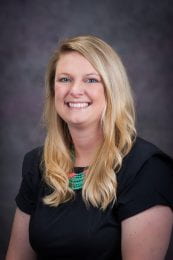 Amy Geyer joined the Business Hub as the Office/Extension Specialist in Summer 2022. Amy attended Kansas State University and Highland Community College and worked previously in the Department of Clinical Sciences at Vet Med. In her current role, Amy works with the Extension Diagnostic Team as well as acts as the primary administrative support for the Department and Business Hub.
Amy Geyer joined the Business Hub as the Office/Extension Specialist in Summer 2022. Amy attended Kansas State University and Highland Community College and worked previously in the Department of Clinical Sciences at Vet Med. In her current role, Amy works with the Extension Diagnostic Team as well as acts as the primary administrative support for the Department and Business Hub.
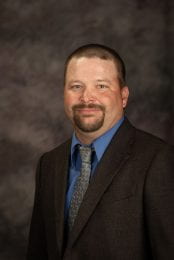 Daniel Hopper joined the Akhunov lab as a Research Assistant in Fall 2022. He completed his BS in Agricultural Economics with a minor in Horticulture at Kansas State University. He most recently worked as an Assistant Scientist in the Sorghum Breeding Lab in the K-State Agronomy Department. In his current role, Daniel actively works with Wheat Genetics Resource Center supporting field and greenhouse experiments. He helps to maintain and operate the greenhouse and field facilities as well as plants, maintains and harvests field and greenhouse-grown genetic material for research projects.
Daniel Hopper joined the Akhunov lab as a Research Assistant in Fall 2022. He completed his BS in Agricultural Economics with a minor in Horticulture at Kansas State University. He most recently worked as an Assistant Scientist in the Sorghum Breeding Lab in the K-State Agronomy Department. In his current role, Daniel actively works with Wheat Genetics Resource Center supporting field and greenhouse experiments. He helps to maintain and operate the greenhouse and field facilities as well as plants, maintains and harvests field and greenhouse-grown genetic material for research projects.
 Jaideep Mallick began his work as the Fungal Genetic Stock Center (FGSC) Curator in Winter 2022. He completed his Master of Philosophy in Bio-Chemistry and his Ph.D. in Biochemistry at Jawaharlal Nehru University, New Delhi, India. He most recently worked as a Scientist in Quebec, Canada. In his current role, Jaideep is an essential part of the management of day-to-day operations of the FGSC as well as helps to represent the FGSC at scientific and technical meetings and assists with the organization of workshops under the auspices of the FGSC.
Jaideep Mallick began his work as the Fungal Genetic Stock Center (FGSC) Curator in Winter 2022. He completed his Master of Philosophy in Bio-Chemistry and his Ph.D. in Biochemistry at Jawaharlal Nehru University, New Delhi, India. He most recently worked as a Scientist in Quebec, Canada. In his current role, Jaideep is an essential part of the management of day-to-day operations of the FGSC as well as helps to represent the FGSC at scientific and technical meetings and assists with the organization of workshops under the auspices of the FGSC.
 Ankita Mishra joined the Akhunov lab as a Post-Doctoral Fellow in Fall 2022. She completed her PhD in Biotechnology at Panjab University, Chandigarh, India. She most recently worked as a Postdoctoral Research Associate at the DBT-National Agri-Food Biotechnology Institute in Punja, India. In her new role, Ankita will help to map and characterize genes and pathways underlying variation in disease resistance and/or productivity traits in wheat with the final goal of applying knowledge for crop improvement.
Ankita Mishra joined the Akhunov lab as a Post-Doctoral Fellow in Fall 2022. She completed her PhD in Biotechnology at Panjab University, Chandigarh, India. She most recently worked as a Postdoctoral Research Associate at the DBT-National Agri-Food Biotechnology Institute in Punja, India. In her new role, Ankita will help to map and characterize genes and pathways underlying variation in disease resistance and/or productivity traits in wheat with the final goal of applying knowledge for crop improvement.
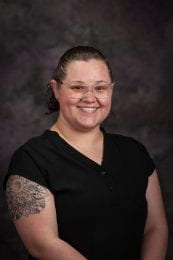 Haley Scott began her work as a Research Technician with the Stack Lab in Spring 2022. Haley received her Bachelor of Science in Microbiology from Kansas State University in December 2021. She previously worked with the USDA APHIS PPQ Domestic Identifier Laboratory and the Plant Disease Diagnostic Lab as an undergrad. In her current role, Haley works in the biosafety level (BSL-) 1 and 2 laboratories as well as in the BSL-3 laboratory within our state-of-the-art biocontainment facility conducting research with a select agent bacterium.
Haley Scott began her work as a Research Technician with the Stack Lab in Spring 2022. Haley received her Bachelor of Science in Microbiology from Kansas State University in December 2021. She previously worked with the USDA APHIS PPQ Domestic Identifier Laboratory and the Plant Disease Diagnostic Lab as an undergrad. In her current role, Haley works in the biosafety level (BSL-) 1 and 2 laboratories as well as in the BSL-3 laboratory within our state-of-the-art biocontainment facility conducting research with a select agent bacterium.
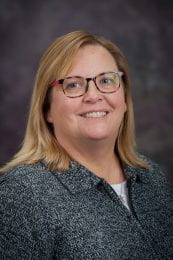 Ann Treinen joined the Business Hub as the Human Capital Specialist in Summer 2022. Ann has worked at K-State since 1998, beginning as an Administrative Officer in the Controller’s Office. In 2017, she was selected to join the Administrative Support Center as a Human Capital Representative. In her Human Capital Specialist role, she helps to support the HR efforts for both Horticulture & Natural Resources and Plant Pathology.
Ann Treinen joined the Business Hub as the Human Capital Specialist in Summer 2022. Ann has worked at K-State since 1998, beginning as an Administrative Officer in the Controller’s Office. In 2017, she was selected to join the Administrative Support Center as a Human Capital Representative. In her Human Capital Specialist role, she helps to support the HR efforts for both Horticulture & Natural Resources and Plant Pathology.
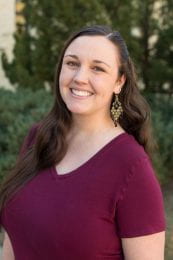 Mallory Whitman was hired in Spring 2022 as the Human Capital Analyst in the Business Hub. She has worked in higher education human resources since 2019 and most recently was employed as the Employment Coordinator at Cameron University until her family relocated to Manhattan. In her role as a Human Capital Analyst, Mallory helps to lead the HR efforts for both Horticulture & Natural Resources and Plant Pathology.
Mallory Whitman was hired in Spring 2022 as the Human Capital Analyst in the Business Hub. She has worked in higher education human resources since 2019 and most recently was employed as the Employment Coordinator at Cameron University until her family relocated to Manhattan. In her role as a Human Capital Analyst, Mallory helps to lead the HR efforts for both Horticulture & Natural Resources and Plant Pathology.
New Graduate Students
Claudio Dias da Silva – Graduate Research Assistant – Spring 2023
(Supervisor: Dr. Kelsey Andersen Onofre)
Claudio is a PhD graduate student coming from Sao Paulo, Brazil. His educational background is in phytopathology, molecular biology, diagnosis, isolation, and statistical analysis.
Madison Kessler – Graduate Research Assistant – Summer 2022
(Supervisor: Dr. Rodrigo Onofre)
Madison is a MS graduate student who graduated in Spring 2022 from Clemson University. Her educational background is in Biological Sciences, Plant Pathology and Biochemistry.
Tom McAnany – Graduate Research Assistant – Spring 2023
(Supervisor: Dr. David Cook)
Tom is a MSc graduate student in Genetics coming from Kansas State University. His educational background is in Plant Biology, Cellular and Molecular Biology.
Aiden McVey – Graduate Research Assistant – Fall 2022
(Supervisor: Dr. David Cook)
Aiden is a PhD graduate student in Genetics coming from Montana State University. His educational background is in Biotechnology.
Nick Stelling – Graduate Research Assistant – Spring 2023
(Supervisor: Dr. Eduard Akhunov)
Nick is a Ph.D. graduate student in Genetics from Rockwell City, IA. His educational background is in Genetics.
Giovanna Teixeira Sandoval Moreira – Graduate Research Assistant – Spring 2023
(Supervisor: Dr. Harold Trick)
Giovanna is a MSc graduate student originally from Acre, Brazil. Her educational background is in Agronomic Engineering.
Lawrence Tidakbi – Graduate Research Assistant – Fall 2022
(Supervisor: Dr. Jessica Rupp)
Lawrence is a PhD graduate student originally from Ghana. His educational background is in Crop Science and Horticulture.
Angel Trinidad – Graduate Research Assistant – Summer 2022
(Supervisor: Dr. Kelsey Andersen Onofre)
Angel is an MS graduate student coming from California State University. His educational background is in Plant and Soil Science.
Promotions
Three faculty promotions became official in summer 2022. We recognize the excellence in their programs and look forward to their future contributions as they take their careers to the next step.
- Congratulations to Dr. David Cook on being promoted to Associate Professor.
- Congratulations to Dal-Hoe Koo on being promoted to Research Associate Professor.
- Congratulations to Jagger Harvey on being promoted to Research Professor.
Personnel Changes
- Sarah Bastian – Sarah began her new role as the Project/Program Coordinator in the Akhunov Lab in September 2022. She previously was a Research Assistant with Dr. Akhunova’s team.
- Chandler Day – Chandler began a new position as Associate Diagnostician in the Plant Diagnostic Lab in January 2022. She previously was the Assistant Director in the Great Plains Diagnostic Network.
- Afsana Noor – Afsana began her new role as a Fellow (PostDoc) in December 2022 with the Little Lab after completing her PhD in Plant Pathology.
- Nar Ranabhat – Nar started in his new role as a Fellow (PostDoc) in August 2022 with the Stack Lab after completing his PhD in Plant Pathology.
- Wei Wang – Wei departed after 9 years as a Fellow (PostDoc) then a Research Assistant Professor to begin a faculty position. We will miss Wei but congratulate him on taking this next exciting step in his career.
- Shuangye Wu – Shuangye transitioned into a new role in the Crain Lab as a Research Associate in June 2022. She previously was a Research Associate with the WGRC.
Retirements
 Congratulations to Duane Wilson who retired in summer 2022 after more than 40 years of service. Duane was integral to the success of the Wheat Genetics Resource Center (WGRC), running key aspects of the greenhouse and field program. One of the many highlights of Duane’s time was his outstanding mentoring of undergraduate and graduate students. Duane was always ready to lend a hand. We will miss his dedication and kind heart. We wish him the best.
Congratulations to Duane Wilson who retired in summer 2022 after more than 40 years of service. Duane was integral to the success of the Wheat Genetics Resource Center (WGRC), running key aspects of the greenhouse and field program. One of the many highlights of Duane’s time was his outstanding mentoring of undergraduate and graduate students. Duane was always ready to lend a hand. We will miss his dedication and kind heart. We wish him the best.
 Bruce Ramundo retired from Kansas State University after more than 40 years of service as an Associate Scientist in the Department of Plant Pathology. Bruce worked in the laboratories of four faculty members, supporting key research on viral, bacterial and fungal plant pathogens. He has been a key player in the national/international success and reputation of the Fusarium Workshop. In addition, he has been an outstanding department safety officer. The Department will truly miss Bruce’s strong work ethic, patience, and sense of humor. We wish him the best in his retirement.
Bruce Ramundo retired from Kansas State University after more than 40 years of service as an Associate Scientist in the Department of Plant Pathology. Bruce worked in the laboratories of four faculty members, supporting key research on viral, bacterial and fungal plant pathogens. He has been a key player in the national/international success and reputation of the Fusarium Workshop. In addition, he has been an outstanding department safety officer. The Department will truly miss Bruce’s strong work ethic, patience, and sense of humor. We wish him the best in his retirement.
Diagnostic and Extension highlights
The extension team engaged with stakeholders all over the state of Kansas this past year. Collectively, the team authored five formal extension publications, published 56 newsletter articles (primarily through the Agronomy eUpdates, and K-State Turf & Landscape Blog) delivered 87 presentations, participated in 12 radio interviews, and provided more than 1,000 disease diagnoses through the K-State Plant Diagnostic Lab. 2022 was a particularly busy year for wheat virus testing. The team has developed a new PCR diagnostic test for Fusarium virguliforme, sudden death syndrome (SDS) and is working closely with our wheat research team to plan for the 2023 wheat virus testing season. On the home landscape and garden side Judy O’Mara contributed to online and in-person Extension Master Gardener Training and the online K-State Garden Hour which started in the pandemic but continues to be a highly valued resource. Finally, Megan Kennelly contributed a much-expanded chapter in the newly-revised Kansas Garden Guide.
Other special highlights
Our department is active in professional and academic service here at K-State and in our professional societies. Here are a few recent highlights:
Dr. Chris Little finished a 3-year term on Faculty Senate including serving on the Faculty Affairs Committee. Faculty Senate is a key piece of shared governance at the university and works on policy updates, curriculum changes, and other broad initiatives. Serving as a senator takes time and dedication. Thank you Dr. Little.
Dr. Richard Todd is serving Aspergillus Genomes Research Policy Group Executive Committee and is the chair of this international group that coordinates international Aspergillus (Asperfest) meetings and Aspergillus community resources
Dr. Harold Trick has resumed his role as chair of the K-State Institutional Biosafety Committee. The IBC plays a key role on campus to ensure research is conducted following all appropriate protocols.
Dr. Alina Akhunova, Director of the Integrated Genomics Facility, did an outstanding job equipping the IGF with a new Chromium iX (10X Genomics) and the Sequel IIe system (PacBio). We appreciate Dr. Akhunova’s dedication to keeping K-State on the cutting edge genomics technologies. The IGF ran a successful Genomics Technologies Workshop in summer 2022 which was well received after the covid19 disruptions to the workshop in recent years.
Dr. David Cook has stepped into the role of Graduate Program Director for Plant Pathology. Dr. Cook is now leading recruitment, onboarding, and academic program facilitation for the program. Early in his role Dr. Cook conducted surveys of faculty and student applications to help make strategies for moving the program forward.
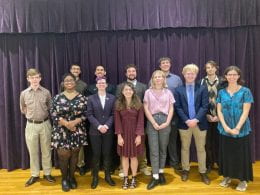
The Department ran its summer Research and Extension Experiences for Undergraduates program again in 2022. We hosted 12 participants from all over the US. Students were placed with mentors in Plant Pathology, Entomology, Horticulture & Natural Resources, Biochemistry, and Agronomy. Students completed independent research, took many field trips, attended sessions on science communication and other professional development topics, and presented posters in a final symposium.
Dr. Shahideh Nouri completed the Coffman Institute, a multi-part leadership training program hosted by K-State with participants from across the university.
Recent publications
Here is a collection of 2022 manuscripts from the department. Great work by our teams!
Guo Y, Betzen B, Salcedo A, He F, Bowden RL, Fellers JP, Jordan KW, Akhunova A, Rouse MN, Szabo LJ, Akhunov E. Population genomics of Puccinia graminis f.sp. tritici highlights the role of admixture in the origin of virulent wheat rust races. Nat Commun. 2022, 13(1):6287.
Wang W, Yu Z, He F, Bai G, Trick HN, Akhunova A, Akhunov E. Multiplexed promoter and gene editing in wheat using a virus-based guide RNA delivery system. Plant Biotechnol J. 2022, 20(12):2332-2341.
He F, Wang W, Rutter WB, Jordan KW, Ren J, Taagen E, DeWitt N, Sehgal D, Sukumaran S, Dreisigacker S, Reynolds M, Halder J, Sehgal SK, Liu S, Chen J, Fritz A, Cook J, Brown-Guedira G, Pumphrey M, Carter A, Sorrells M, Dubcovsky J, Hayden MJ, Akhunova A, Morrell PL, Szabo L, Rouse M, Akhunov E. Genomic variants affecting homoeologous gene expression dosage contribute to agronomic trait variation in allopolyploid wheat. Nat Commun. 2022, 13(1):826.
Taagen E, Jordan K, Akhunov E, Sorrells ME, Jannink JL. If it ain’t broke, don’t fix it: evaluating the effect of increased recombination on response to selection for wheat breeding. G3 (Bethesda). 2022, 12(12):jkac291.
Tene M, Adhikari E, Cobo N, Jordan KW, Matny O, del Blanco IA, Roter J, Ezrati S, Govta L, Manisterski J, Yehuda PB, Chen X, Steffenson B, Akhunov E, Sela H. GWAS for Stripe Rust Resistance in Wild Emmer Wheat (Triticum dicoccoides) Population: Obstacles and Solutions. Crops. 2022, 2(1), 42-61.
Glenn P, Zhang J, Brown-Guedira G, DeWitt N, Cook JP, Li K, Akhunov E, Dubcovsky J Identification and characterization of a natural polymorphism in FT-A2 associated with increased number of grains per spike in wheat. Theor Appl Genet. 2022, 135(2):679-692.
Jordan KW, Bradbury PJ, Miller ZR, Nyine M, He F, Fraser M, Anderson J, Mason E, Katz A, Pearce S, Carter AH, Prather S, Pumphrey M, Chen J, Cook J, Liu S, Rudd JC, Wang Z, Chu C, Ibrahim AMH, Turkus J, Olson E, Nagarajan R, Carver B, Yan L, Taagen E, Sorrells M, Ward B, Ren J, Akhunova A, Bai G, Bowden R, Fiedler J, Faris J, Dubcovsky J, Guttieri M, Brown-Guedira G, Buckler E, Jannink JL, Akhunov ED. Development of the Wheat Practical Haplotype Graph Database as a Resource for Genotyping Data Storage and Genotype Imputation. G3 (Bethesda). 2022 12(2):jkab390.
Chen YY, Schreiber M, Bayer MM, Dawson IK, Hedley PE, Lei L, Akhunova A, Liu C, Smith KP, Fay JC, Muehlbauer GJ, Steffenson BJ, Morrell PL, Waugh R, Russell JR. The evolutionary patterns of barley pericentromeric chromosome regions, as shaped by linkage disequilibrium and domestication. Plant J. 2022, 111(6):1580-1594.
De Wolf, E., Andersen Onofre, K., Lollato, R. Early Season Environmental Indicators of Wheat Stripe Rust Epidemics in the Central Great Plains Region of North America. Plant Disease. First look. doi.org/10.1094/PDIS-08-22-1873-RE
Buddenhagen, C., Xing, Y., Andrade-Piedra, J. Forbes, G., Kromann, P., Navarrete, I., Thomas-Sharma, S., Choudhury, R., Andersen Onofre, K., Schulte-Geldermann, E., Etherton, B., Sulá, P., Garrett, K. 2022. Where to Invest Project Efforts for Greater Benefit: A Framework for Management Performance Mapping with Examples for Potato Seed Health. Phytopathology. 112:7, 1431-1443.
Huang J, Rowe D, Zhang W, Suelter T, Valent B, Cook DE #. 2022. CRISPR-Cas12a induced DNA double-strand breaks are repaired by multiple pathways with different mutation profiles in Magnaporthe oryzae. Nature Communications 13 (1), 1-18 https://doi.org/10.1038/s41467-022-34736-1
Huang J, Cook DE #. 2022. The contribution of DNA repair pathways to genome editing and evolution in filamentous pathogens. FEMS Reviews Microbiology fuac035 https://doi.org/10.1093/femsre/fuac035
Sia J, Zhang W, Jonckheere E, Cook DE#, Bogdan P#. 2022. Inferring functional communities from partially observed biological networks exploiting geometric topology and side information. Nature Scientific Reports 12 (1), 1-17 https://doi.org/10.1038/s41598-022-14631-x
Sharma VK, Marla S, Zheng WG, Mishra D, Huang J, Zhang W, Morris GP, and DE Cook#. 2022. RNA silencing by CRISPR in plants does not require Cas13. Genome Biology 23 (1), 1-24 https://doi.org/10.1186/s13059-021-02586-7
Kramer M, Seidl MF, Thomma BPHJ#, Cook DE. 2022. Local rather than global H3K27me3 dynamics are associated with differential gene expression in Verticillium dahliae. mBio 13 (1) https://doi.org/10.1128/mbio.03566-21
Adhikari, L., Shrestha, S.,Wu, S.,Crain, J., Gao, L., Evers, B., Wilson, D., Ju, Y., Koo, D-H., Hucl, P., Pozniak, C., Walkowiak, S., Wang, X., Wu, J., Glaubitz, J., DeHaan, L., Friebe, B., & Poland, J. (2022). A high-throughput skim-sequencing approach for genotyping, dosage-estimation and identifying translocations. Nature Scientific Reports 12(1): 17583. doi: 10.1038/s41598-022-19858-2.
Jones, T., Monaco, T., Larson, S., Hamerlynck, E. & Crain, J. (2022). Using genomic selection to develop performance-based restoration plant materials. International Journal of Molecular Sciences (23)8275. https:// doi.org/10.3390/ijms23158275
Crain, J., Larson, S., Dorn, K., DeHaan, L., & Poland, J. Genetic architecture and QTL selection response for Kernza perennial grain domestication traits. Theoretical and Applied Genetics. https://doi.org/10.1007/s00122-022-04148-2.
Crain, J., Wang, X., Evers, B., & Poland, J. Field-based single plant phenotyping for wheat breeding. The Plant Phenome Journal. e20045. https://doi.org/10.1002/ppj2.20045.
Silva, P., Evers, B., Kieffaber, A., Wang, X., Brown, R., Gao, L., Fritz, A., Crain, J., & Poland, J. Applied phenomics and genomics for improving barley yellow dwarf resistance in winter wheat. G3 Genes|Genomes|Genetics 12(7). doi: https://doi.org/10.1093/g3journal/jkac064.
Adhikari L, Raupp J, Wu S, Wilson D, Evers B, Koo D-H, Singh N, Friebe B, Poland J. (2022). Genetic characterization and curation of diploid A-genome wheat species. Plant Physiology, 188(4), 2101-2114,
Sharma JS, Fetch TG, Ghazvini H, Rouse MN, Danilova T, Friebe B, Hiebert CW. 2022. Origin and genetic analysis of stem rust resistance in wheat line Tr129. Nature Scientific Reports 12: 4585, doi.org/10.1038/s41598-022-08681-4,.
Adhikari L, Shrestha S, Wu S, Crain J, Gao L, Evers B, Wilson D, Ju Y, Koo D-H, Hucl P, Pozniak C, Walkowiak S, Wang X, Wu J, Glaubitz J, DeHaan L, Friebe B, Poland J. 2022. A high-throughput skim-sequencing approach for genotyping, dosage estimation and identifying translocations. 23-073-J, Nature Scientific Reports 12: 17583, doi.org/10.1038/s41598-022-19858-2,
Costa, M. M., A. A. Saleh, M. P. Melo, E. A. Guimarães, P. Esele, K. A. Zeller, B. A. Summerell, L. H. Pfenning & J. F. Leslie. 2022. Fusarium mirum sp. nov, intertwining Fusarium madaense and Fusarium andiyazi, pathogens of tropical grasses. Fungal Biology 126: 250-266. DOI: 10.1016/j.funbio.2021.12.002.
Krska, R., J. F. Leslie, S. Haughey, M. Dean, Y. Bless, O. McNerney, C. Elliott, & M. Spence. 2022. Effective approaches for early identification and proactive mitigation of aflatoxin in peanuts – An EU-China perspective. Comprehensive Reviews in Food Science and Food Safety 21: 3227-3243. DOI: 10.1111/1541-4337.12973.
Noor, A., and Little, C.R. 2022. Evaluating the role of exogenously applied ascorbic acid in rescuing soybean plant health in the presence of pathogen-induced oxidative stress. Pathogens 11: 1117.
Pimental, M.F., Srour, A.Y., Warner, A.J., Bond, J.P., Bradley, C., Rupe, J., Chilvers, M., Little, C., Robertson, A., Giesler, L., Malvick, D., Kurle, J., Wise, K., Tenuta, A., and Fakhoury, A.M. 2022. Ecology and diversity of fungal species associated with soybean seedling diseases in the US Midwest. Journal of Applied Microbiology 132: 3797-3811.
G Lin, S Liu. 2022. The Canu genome assembly pipeline using Nanopore long reads. Bio-101, e4501.
SA Sprague, TM Tamang, T Steiner, Q Wu, Y Hu, T Kakeshpour, J Park, J Yang, Z Peng, B Bergkamp, I Somayanda, M Peterson, EO Garcia, Y Hao, PS Amand, G Bai, PA Nakata, I Rieu, DP Jackson, N Cheng, B Valent, KD Hirschi, SVK Jagadish, S Liu, FF White, S Park. 2022 Redox-engineering enhances maize thermotolerance and grain yield in the field, Plant Biotechnol J, 10.1111/pbi.13866
G Lin, H Chen, B Tian, SK Sehgal, L Singh, J Xie, P Juliana, N Singh, N Rawat, S Shrestha, D Wilson, H Shult, H Lee, VK Tiwari, RP Singh, MJ Guttieri, HN Trick, J Poland, RL Bowden, G Bai, B Gill, S Liu&. 2022 Cloning of the Broadly Effective Wheat Leaf Rust Resistance Gene Lr42 Transferred from Aegilops tauschii, Nat Commun, 13:3044.
Y Wang, J Zhang, M Sun, C He, K Yu, B Zhao, R Li, J Li, Z Yang, X Wang, H Duan, J Fu, S Liu, X Zhang, J Zheng. 2022 Multi-omics analyses reveal systemic insights into maize vivipary, Plants (Basel), 10:2437.
G Shi, G Kariyawasam, S Liu, Y Leng, S Zhong, S Ali, P Moolhuijzen, CS Moffat, JB Rasmussen, TL Friesen, JD Faris, Z Liu. 2022 A conserved hypothetical gene is required but not sufficient for Ptr ToxC production in Pyrenophora tritici-repentis, Mol Plant Microbe Interact, MPMI12210299R.
Melo, P., Onofre, R. B., Rea, M., Bierman, A., Gadoury, D. M., Peres, Ivors, K., Broome, J. C., N. A. Design, Construction, and Evaluation of Equipment for Nighttime Applications of UV-C for Management of Strawberry Powdery Mildew in Florida and California. Plant Health Progress. 2022. https://doi.org/10.1094/PHP-01-22-0002-RS
Onofre, R. B., Gadoury, D. M., Stensvand, A., Bierman, A., Rea, M., Peres, N. A. UV- Transmitting plastics reduce powdery mildew in strawberry tunnel production. Plant Disease. 2022 https://doi.org/10.1094/PDIS-10-21-2195-RE.
Ranabhat, N.B., Bruce, M.A., Fellers, J.P., and Rupp, J.L.S., (2022) A reproducible methodology for absolute viral quantification and viability determination in mechanical inoculations of wheat streak mosaic virus. Tropical Plant Pathology. 47, 553–561. doi:10.1007/s40858-022-00507-y.
Stack, J.P. and Cardwell, K. 2022. Communications Ecosystem to Support the Assay Validation Community: A Concept. PhytoFrontiers Published Online: 9 Oct 2022 – FIRST LOOK https://doi.org/10.1094/PHYTOFR-05-22-0055-FI
DeLude, A., Wells, R., Boomla, S. Chuang, SC, Urena, F., Shipman, A., Rubas, N., Kuehu, D.L., Bickerton, B., Peterson, T., Dobhal, S., Arizala, D., Klair, D., Ochoa-Corona, F., Ali, M.E., Odani, J., Bingham, J.P., Jenkins, D., Fletcher, J., Stack, J.P., Alvarez, A.M., and Arif, M. 2022 Loop-mediated isothermal amplification (LAMP) assay for specific and rapid detection of Dickeya fangzhongdai targeting a unique genomic region. Sci Rep 12, 19193 (2022). https://doi.org/10.1038/s41598-022-22023-4
Todd, R.B.C, Wong, K.H., Goldman, G.H. (2022) Editorial: Transcription factors and regulation of transcriptional programs in fungi. Frontiers in Fungal Biology. 3:1117910. https://doi.org/10.3389/ffunb.2022.1117910
Monica Navia-Urrutia, Gloria Mosquera, Rebekah Ellsworth, Mark Farman, Harold N. Trick, and Barbara Valent. 2022. Effector genes in Magnaporthe oryzae Triticum as Potential Targets for Incorporating Blast Resistance in Wheat. Plant Disease DOI: 10.1094/PDIS-10-21-2209-RE
Hui Chen, Zhenqi Su, Bin Tian, Yang Liu, Yuhui Pang, Volodymyr Kavetskyi, Harold N. Trick and Guihua Bai. 2022. Development and optimization of a Barley stripe mosaic virus (BSMV)-mediated gene editing system to improve Fusarium head blight (FHB) resistance in wheat. Plant Biotechnology Journal Jun; 20(6):1018-1020. doi: 10.1111/pbi.13819. Epub 2022 Apr 8.
Braun, R. C., Patton, A. J., Chandra, A., Fry, J. D., Genovesi, A. D., Meeks, M.,Kennelly, M. M., Xiang, M., Chhetri, M., Richardson, M. D., Richmond, D. S., Pudzianowska, M. T., & Baird, J. H. (2022). Development of winter hardy,fine-leaf zoysiagrass hybrids for the upper transition zone. Crop Science, 62, 2486–2505.https://doi.org/10.1002/csc2.20834
Thank you!
Thank you for reading our news! If you are an alum of our department please get in touch and let us know what you are doing. You can contact us by emailing Megan Kennelly. You can also follow us on Facebook and on Twitter (@KSUPlantDr)
If you are interested in supporting the department financially you may donate through the KSU Foundation. Visit the Foundation page, click on College of Ag, and follow the prompts to donate to the Plant Pathology Department Excellence Fund (Fund # D35825). The Excellence Fund is used to support Seminar speakers from outside K-State and may be used to supplement graduate student learning opportunities.



















































